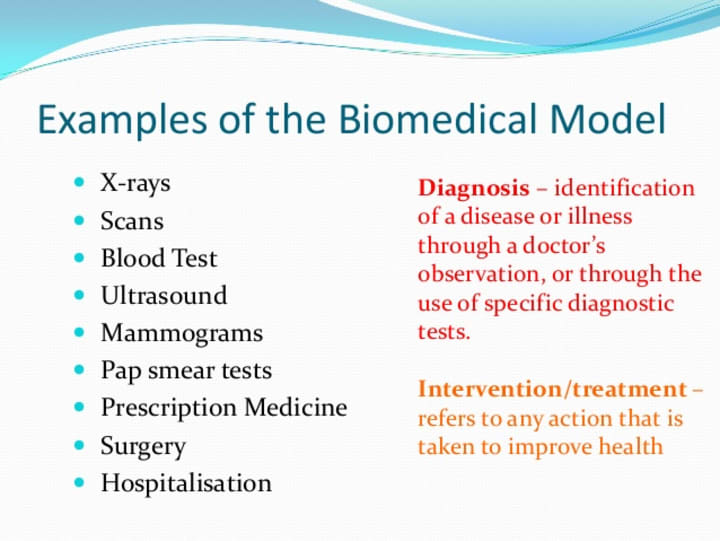Holistic Health
and its effect on Mental Health

Holistic Health is an approach to life. Rather than focusing on illness or specific parts of the body, this approach to health considers the whole person and their interactions within their environment. It accentuates the mind, body, and spirit connection, with the goal being to achieve optimum well-being. Holistic health patients accept responsibility for their own level of well-being, and their everyday choices, to take responsibility of their own health. The four strategies to consider when promoting positive mental health are; encourage typical life experiences, increase coping skills, increase social support, and empower families (Huff, McClanahan & Omar, 2010). Holistic medicine focuses on treating the entire person and not just the disorder or affliction. In the assessment and management of chronical illness and specific disorders the holistic health care provider considers biopsychosocial factors of biological, psychological, and social concerns. These biopsychosocial aspects influence one another and are integral to healthy emotional functioning (Huff, McClanahan & Omar, 2010). In considering wellness, fostering positive mental health, the medical management goal is to minimize the impact of the disease on the physical, emotional development and functioning of the patient. Holistic health promotes a mental health goal of achieving balance between disease management and positive mental health. The Holistic health care provider embraces quality of life, believing all parts of physical, emotional, environmental, and spiritual aspects help patient life balance to address any issues, sickness, or disorder, to make a person whole (Walter, 1999).

Foundations Recovery Network, (2019) suggest holistic providers do not discount traditional medicine, rather sometimes use it with alternative methods. While, traditional medical interventions usually treat the body and ignore the mind, and conventional mental health professionals only treat the mind. Neither one of them address the spiritual. Both methods treat symptoms using drugs or medical procedures rather than looking for the cause of the symptoms. The holistic health approach does not view the body, mind and spirit as a separate entity and encourages drugs and surgery only after other solutions have been sought. Holism looks for the underlying causes of symptoms, rather than just covering up the symptoms with a drug. Perkins, (2015) offers most holistic approaches are complimentary, alternative, or natural. Furthermore, holistic health encompasses a wellness approach in the holistic field, which is recognised as wholesome, healthy, and not harmful or toxic to the individual or the environment. It promotes balance and harmony for the individual, society, and the planet. Perkins, (2015) highlights the holistic approach encourages the patient to engage in self-care and educate themselves about their own health. It urges the individual to be a more active participant in their treatment and health care, rather than giving full autonomy to the health care provider. Perkin, (2015) suggests a holistic stratagem ensuing; each patient should be treated as the unique person and not as their disorder or disease; everyone has the potential to better themselves; treatment works to fix the root cause and not just the symptoms; and it promotes positive working alliance with the patient and health care provider, working together to resolve the problem.

Gluck, (2019) views, holistic health is an alternative approach to mental health care emphasizing the interrelationship between mind, body, and spirit which plays a key role in recovery and healing. Whereby some patients with mental health problems recover using alternative methods alone, many people need to combine methods to include therapy and medication. It is crucial, however, for the patient and health care providers to work together, regarding the approaches required to achieve mental wellness. Experts offer when treating diseases for specific conditions some medical cures have proven more harmful than the disease. That is, many chronic conditions do not respond to scientific medical treatments. Turning to other options, people accept the holistic approach to health and healing. The U.S. Centres for Disease Control and Prevention report key factors that influence a person’s state of health and have not changed significantly over the past 20 years. Quality of medical care is only 10%. heredity accounts for 18% and environment is 19%. Everyday lifestyle choices are 53%. The decisions people make about their life and habits are, therefore, by far the greater factor in determining their state of wellness (Walter, 1999). Holistic health lifestyle ideologies of applied options meet the growing desire for enjoying patient vitality and well-being.

Meglathery, (2019) argument multi-system imbalances, with benefits from holistic care in the healing process. For example, a patient with a non-specific physical symptom due to a medical condition has the possibility to develop psychological symptoms in response to the losses related with not feeling physically well, e.g., sadness, lack of enjoyment, nostalgia, and often social withdrawal, not wanting to be burdensome. Also, behavioural symptoms could modulate the physical symptoms or provide other sources of enjoyment, such as less physical action and perhaps overeating or overuse of painkillers. These feelings of illness, sad, nostalgic, isolation and loneliness, coupled with pain pill dependency might lead to an inability to work and to then create other issues associated with major lifestyle change. Such as, loss of identity, loss of purpose and loss of financial security. In this case, the person is presenting existential crisis, i.e., loss of purpose or meaning for life, and leading to, especially with a genetic predisposition, a diagnosable, full criteria psychiatric condition like panic disorder or depression (Meglathery, 2019).

The University of Minnesota, (2016) highlights, there are many complementary and alternative therapies now offered in clinics and hospitals endorsing their uses that are accepted and growing rapidly. Experts suggest the traditional goal of moving towards integrative healthcare, for the best outcomes for the patient. Thus, when the patient and holistic practitioner look for an alternative or complementary treatment, it is imperative to evaluate every part of the integrative healthcare plan, whether complementary or conventional, to determine if it is safe and effective. Therefore, the risks, benefits, and evidence need to be evaluated and then determine if the therapy is right for the patient. There are literally hundreds of types of holistic healing practices, with new therapies or variations emerging continuously. This can overwhelm the patient when they first start researching (Kreitzer, 2016).

Meglathery, (2019) enlighten many psychological (stress) or psychiatric conditions can be associated with major effects on the body, producing symptoms of deceptive medical diseases. Stress causes a host of physical symptoms; panic attacks appear like a heart attack, people with bipolar disorder can have severe appetite disturbance, circadian rhythm alterations and disabling fatigue, to that of worsening medical diseases. Consequentially, emotional stress can upregulate pain pathways to increase a person's pain. Medical conditions cause symptoms and require treatments which affect quality of life and cause psychiatric problems. The Department of Health, (2013) offer recovery-oriented mental health practices and service delivery acknowledges the impact which affect a person’s mental health and wellbeing and provides a range of holistic and person-centred treatments, rehabilitation, psycho-social and recovery support. Holistic and person-centred treatments are embedded with the paradigm of holism with views that biopsychosocial and physiological make an individual whole. Holism seeks to ensure the needs of the individuals accessing health care services are met with respect and responsiveness, in relation to making clinical decisions, the standards and concepts are grounded by values, personal preferences and partnerships (Delaney, 2018).

The national Centre of Complementary and Integrative Health, (NCCIH), cluster most of these therapies and practices into five categories to identify key characteristics of any holistic practice or therapy.
1. Alternative Medical Systems. Complete systems which developed outside of the Western biomedical method. i.e., Traditional Chinese Medicine and Ayurveda.
2. Mind-body Interventions. Includes behavioural, psychological, social, and spiritual approaches. i.e., Cancer support groups and relaxation programs.
3. Biologically Based Healing. Uses plants or other biological materials. i.e., Herbal medicines and Aromatherapy.
4. Manipulative & Body-Based Methods. Manipulation, touch, or movement of the physical body. i.e., Massage and Chiropractic.
5. Energy Therapies. Forms of energy to heal. e.g., Electromagnetic, ultrasonic, thermal, or subtle energy. i.e., Healing touch and Reiki.
(Kreitzer, 2016).

Conclusively, the holistic perception has a transitioned focus from the disease to a focus on health. The fostered parallel response from the stigma of mental illness recognises that mental health is crucial to overall health (Manderscheid, Ryff, Freeman, McKnight-Eily, Dhingra, & Strine, 2010). Holistic health proposes widespread approaches including, education, communication, self-help, and complementary or alternative treatments. Holistic care is a comprehensive model that identifies holistic health and the behaviour which accepts the interdependences among one's biological, social, psychological, and spiritual aspects (Zamanzadeh, Jasemi, Valizadeh, Keogh,and Taleghani , 2015). Using holistic healing, all aspects of patients and their effects on the treatment process consider the patients’ thoughts, emotions, cultures, opinions, and attitudes which contribute to recovery, happiness, and satisfaction. Holistic care respects human dignity. The relationship between health care provider and the patient is based on respect, relative openness, equality, and empathy and patient participation in the decision making and care options. Holism understands the patient is a whole within their environment and appreciates the body, mind, and spirit. Furthermore, holistic health respects the patient's role in the therapeutic process, making the person the most important part of the process. Mental health practitioners use holistic health in enunciating the process of patient treatment to reassure decision making and support for the best use of treatments and therapies, minimising side effects, achieve optimal, therapeutic levels of medication and to withdraw from medication where appropriate. Holistic health understands the importance of the interplay between physical health, mental health, and coexisting conditions in addressing the individual nature of personal recovery (Department of Health, 2013). Moreover, holistic health encourages self-care an integral aspect of holism which leads to therapeutic consultation, hope, dignity, self-discipline, social growth, a sense of autonomy, vigour, and vitality.

References
Delaney, L.J. (2018). Patient-centred care as an approach to improving health care in Australia. The Australian Journal of Nursing Practice, Scholarship & Research, 25(1),119–123.doi: https://doi.org/10.1016/j.colegn.2017.02.005
Department of Health, (2013). Capability 2A: Holistic and person-centred treatment, care, rehabilitation, and psychosocial and other recovery support. Commonwealth of Australia
Foundations Recovery Network, (2019). Holistic treatment. Dual diagnosis.org. Retrieved from https://www.dualdiagnosis.org/treatment-therapies-for-dual-diagnosis-patients/holistic-treatment/
Gluck, S. (2019). Alternative approaches to mental health treatment. Healthy Place. Retrieved from https://www.healthyplace.com/depression/articles/alternative-approaches-to-mental-health-treatment
Huff, M.B., McClanahan, K. K., and Omar, Hatim A., (2010). Chronic illness and mental health issues. Pediatrics Faculty Publications. 109. https://uknowledge.uky.edu/pediatrics_facpub/109
Kreitzer, M. J., (2016). What are holistic practices? The University of Minnesota. Retrieved from https://www.takingcharge.csh.umn.edu/what-are-holistic-practices
Manderscheid, R., W, Ryff, C.D., Freeman, E. J., McKnight-Eily, L.R, Dhingra, S., and Strine, T. W., (2010). Evolving definitions of mental illness and wellness. Preventing Chronic Disease, 7(1). Retrieved from http://www.cdc.gov/pcd/issues/2010/jan/09_0124.htm.
Meglathery, S. (2019). Why holistic mental health assessment and care. Retrieved from https://www.sharonmeglatherymd.com/WhyHolisticMentalHealth AssessmentandCare.en.html
Perkins, C., (2003-2015). Holistic help. Definition of holistic health. Retrieved from
https://www.holistichelp.net/holistic-health.html
Walter, S. (1999). The Illustrated Encyclopedia of Body-Mind Disciplines: Holistic health. The Rosen Publishing Group. AHHA. Retrieved from https://ahha.org/selfhelp-articles/holistic-health/
Zamanzadeh, V., Jasemi, M., Valizadeh, L., Keogh, B. and Taleghani , F. (2015). Effective factors in providing holistic care: A qualitative study. Indian Journal of Palliative Care, 21(2): 214–224. doi: 10.4103/0973-1075.156506
About the Creator
Shanie Walker
Shanie Walker is a Holistic Behavioural Therapist, awards, and honours in Art Therapy, Dialectic and CBT. Shanie is a Psychologist and Registered Professional Hypnotherapist. Accredited Nutritionist, and Master Degree in Fitness.






Comments
There are no comments for this story
Be the first to respond and start the conversation.